A Long Time in the Making
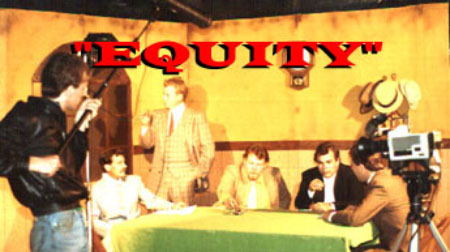

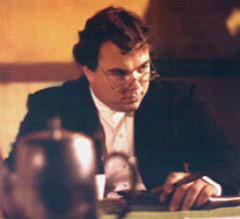 I first wrote Equity in 1987. It was intended as the follow-up production to our modestly successful cable television version of Welcome Home Mr. Carlton, which we used to launch something known as Gem City Playhouse. Unlike Carlton, which was staged in front of a live audience and videotaped for broadcast, we decided to stage Equity like a play but shoot it more like a movie on a soundstage. Since our object was to create a program for community access cable television there would be no hope of generating any revenues or recouping any of our considerable expenses, but we were committed to the idea of using this new medium as an alternative to live theatre and decided to forge ahead at our own personal expense. We had no idea how much of a drain on our limited resources this show was to become.
I first wrote Equity in 1987. It was intended as the follow-up production to our modestly successful cable television version of Welcome Home Mr. Carlton, which we used to launch something known as Gem City Playhouse. Unlike Carlton, which was staged in front of a live audience and videotaped for broadcast, we decided to stage Equity like a play but shoot it more like a movie on a soundstage. Since our object was to create a program for community access cable television there would be no hope of generating any revenues or recouping any of our considerable expenses, but we were committed to the idea of using this new medium as an alternative to live theatre and decided to forge ahead at our own personal expense. We had no idea how much of a drain on our limited resources this show was to become.
The video production of Equity was a strange mixture of joy and suffering. Sometimes things went extremely well and we were delighted with the results and other times it was simply dreadful. Still, the good experiences kept us pouring more and more money into the project until we finally decided that we could continue it no further and pulled the plug on Equity.
For the next 13 years the show pretty much vanished from my consciousness. I think I tried to forget about it and the thousands of dollars my partner Anthony Everitt and I had wasted on trying to bring it to life. Then in 2000 I was doing some “housecleaning” of my old Amiga computer files and ran across an unfinished musical I had started many years ago called George Washington Never Slept Here. In a manic period of creativity (the type of which I am famous for) I rewrote that show in a matter of weeks and was very pleased with the result. It made me start thinking about other older shows of mine which might be “spruced up” and brought back to life and it was then that I rediscovered Equity.
To my pleasant surprise Equity held up very well. There was far more of use in the libretto and the score than I had found in George Washington, and I set about the task of reworking the show. Soon the bitter memories of the failed video began to dissipate and I remembered what it was about the show that kept us going even when it seemed like a foolish endeavor. When some of the original Equity cast members heard that I was giving it another go I was very encouraged by their enthusiasm for the project. Apparently Equity had left a good impression on them, despite the fact that we failed to complete it back in 1987, and they were anxious to reprise their roles in this new version.
As I write this, I am still in the process of completing this “revamped” Equity and hope that it will sometime find a home somewhere, even if its just here in the Cyberspace universe of Undiscovered Musicals.
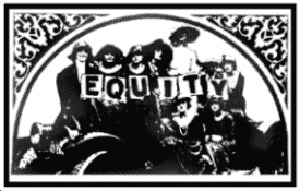
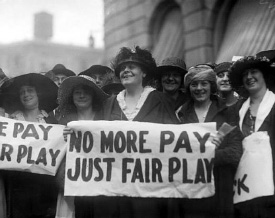 In the late 19th century the traditions of the acting profession had remained largely unchanged since before the birth of the country. The actor/manager was the forerunner of the modern director, staging the play and looking out for the welfare of his fellow cast members. But show business was starting to become big business and in 1896 a group of professional managers (who were not actors) formed the Syndicate, in a power play to gain control of virtually all theatrical activity in America. Actors were suddenly forced to work under whatever arbitrary rules the Syndicate imposed upon them, often rehearsing and even performing without pay. Actors also provided their own costumes and often had to pay their own travel expenses when touring. Some managers made a habit of skipping town when the tour was over and stranding the cast in some far-flung location, often leaving the unpaid bills to the debt of the actors.
In the late 19th century the traditions of the acting profession had remained largely unchanged since before the birth of the country. The actor/manager was the forerunner of the modern director, staging the play and looking out for the welfare of his fellow cast members. But show business was starting to become big business and in 1896 a group of professional managers (who were not actors) formed the Syndicate, in a power play to gain control of virtually all theatrical activity in America. Actors were suddenly forced to work under whatever arbitrary rules the Syndicate imposed upon them, often rehearsing and even performing without pay. Actors also provided their own costumes and often had to pay their own travel expenses when touring. Some managers made a habit of skipping town when the tour was over and stranding the cast in some far-flung location, often leaving the unpaid bills to the debt of the actors.
As the 20th century began, and organized labor was starting to gain a foothold in many areas of employment, some actors advocated the formation of a union of their own to protect their interests and to curb the rampant abuses being practiced by many mangers throughout the theatrical industry. But many other actors resisted the notion of organizing on the grounds that they were artists in a noble and traditional profession and not bricklayers or carpenters. Several unsuccessful attempts at organizing finally led to the establishment of the Actors’ Equity Association, which engaged in a lengthy battle with management for the development of a Standard Contract and a guarantee of fair employment to all actors.
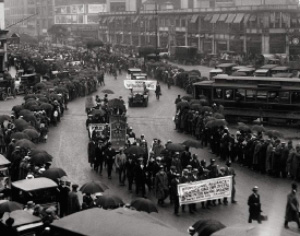 In 1919, pushed to the brink of frustration, Actors’ Equity staged the unthinkable...a strike that closed down most of Broadway and finally forced management back to the bargaining table. It was a remarkable chapter in American history as well as theatrical history for it paved the way for other artists and entertainers to be taken seriously as a body of employees with the resolve to organize and to fight for better working conditions. This is the background for the musical play Equity and the backdrop against which multiple stories develop as fictional and historical characters interweave throughout the various subplots.
In 1919, pushed to the brink of frustration, Actors’ Equity staged the unthinkable...a strike that closed down most of Broadway and finally forced management back to the bargaining table. It was a remarkable chapter in American history as well as theatrical history for it paved the way for other artists and entertainers to be taken seriously as a body of employees with the resolve to organize and to fight for better working conditions. This is the background for the musical play Equity and the backdrop against which multiple stories develop as fictional and historical characters interweave throughout the various subplots.
Equity is much more than a show about a labor dispute, it’s the story of people, famous and forgotten, who made difficult choices and took tremendous risks, often putting themselves at odds with their friends and associates. It’s a colorful story about an exciting and dynamic period of theatrical history. It’s a musical that looks at the grand scale of history through the intimate portraits of the people who lived through it.
